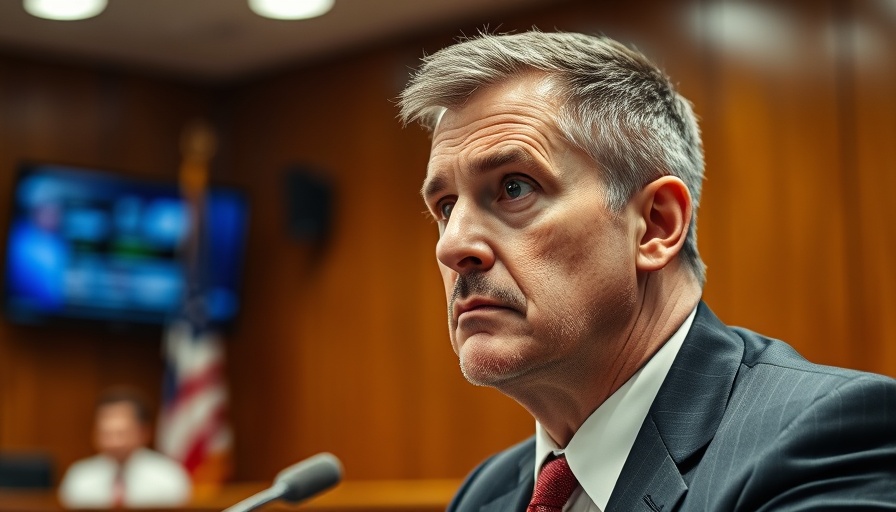
The Stakes of the Trump-Putin Summit for Ukraine
As the world tunes into the unfolding drama surrounding geopolitics, the recent summit held in Alaska between President Donald Trump and Russian President Vladimir Putin draws significant attention, especially for those following the conflict in Ukraine. Despite their claims that the meeting yielded an understanding, the absence of concrete agreements raises crucial concerns about the ramifications for Ukraine's stability.
In the video 'Trump-Putin summit in Alaska has major stakes for Ukraine', the discussion delves into the implications of the summit for Ukraine, highlighting key solutions and perspectives that we’re analyzing further in this article.
What Happened at the Summit?
After more than three hours of conversation, no ceasefire deal emerged. President Trump refrained from sharing specifics, claiming fruitful discussions while emphasizing a future dialogue about Ukraine with President Volodymyr Zelenskyy. While Trump indicated hope for continued talks, both he and Putin avoided addressing the dire humanitarian situation in Ukraine openly.
The tension lies in the fact that Ukraine seemed omitted from crucial discussions about its future, which was underscored by Zelenskyy’s repeated emphasis on the necessity of Ukraine's involvement in negotiations concerning its fate. As Ambassador Bridget Brink highlighted, the meeting has more profound implications: without pressure on Putin, these talks may embolden further aggression against Ukraine.
Concerns from Experts on the Ground
Bridget Brink, a former U.S. ambassador to Ukraine, expressed skepticism regarding any significant outcome from the summit. Brink underscored that talks without Ukraine's direct participation are counterproductive—a sentiment echoed by Ukrainian Americans who are closely following these diplomatic developments.
Elena Danyliuk, a Ukrainian American, voiced her disillusionment, depicting the summit as potentially a mere photo opportunity for Putin. She articulated the pervasive anxiety in Ukraine about the outcomes of such diplomatic measures, given the stark realities of the ongoing war that has already claimed thousands of lives.
Implications of the Summit's Outcome
The summit highlights a critical juncture in U.S.-Russia relations and, importantly, a pivotal moment for Ukraine's sovereignty and safety. Experts stress that Trump holds a significant leverage point regarding sanctions against Russia—an essential tool that could deter Putin’s military expansion.
Discussion surrounding sanctions shows that a lack of pressure on Russia could prolong the violence in Ukraine and perpetuate the humanitarian crisis. As Brink noted, a calculated sanctions program focused on crippling Russia’s war funding could significantly affect Putin's military ambitions, reinforcing that economic stability in Russia could translate into instability for Ukraine, and by extension, Europe.
Public Support and Policy Movements
Support for Ukraine among American citizens continues to grow, spurred by media coverage of the humanitarian crisis and the consequent plight of Ukrainians on the frontlines. There is a palpable frustration regarding the insufficient international response to Putin’s aggression. Many advocates argue for more robust support for Ukraine, not just in statements but in actions, including providing military assistance and humanitarian aid.
Local governments and organizations in Michigan, particularly, have been at the forefront of invoking a collective response, urging elected officials to be clear about their positions as these events unfold. The conversation has turned to tangible support, whether that be lobbying for humanitarian aid or pushing for legislative measures that bolster Ukraine’s defense.
The Human Cost of War: A Call for Awareness
The human suffering reflected in the ongoing conflict cannot be overstated. The narrative of war must encompass the voices of those directly affected—families torn apart, lives disrupted, and communities left fearful and uncertain.
Public awareness campaigns are necessary for clarifying the stakes involved in the geopolitical game played between leaders thousands of miles away. Michiganders, many of whom have family ties to Ukraine, are increasingly demanding accountability from their representatives, echoing the call for stronger policies that prioritize peace and aid for Ukraine.
Next Steps for Michigan Residents
As residents of Metro Detroit and beyond digest this critical moment in international affairs, the focus must shift toward actionable steps. Attending community events and gatherings that promote dialogue on Ukraine issues is vital. Moreover, participating in advocacy and outreach efforts can help amplify the voices calling for peace and support for Ukraine.
The community's involvement could also mean contacting local representatives to express their concerns regarding US policy towards Ukraine and the broader implications of U.S.-Russia relations.
The unfolding political narrative serves as a reminder that every voice counts in shaping national discussions on international conflicts, particularly ones with humanitarian crises as desperate as those faced by Ukraine.
Your Role in Advocacy
Readers are encouraged to stay informed about local developments concerning aid to Ukraine and engage in discussions that could influence public perception and policy. With the situation continuing to evolve post-summit, it is essential to consider how each individual can contribute to fostering understanding and support during these turbulent times.
In an era where local communities can significantly impact global narratives, we should advocate for justice and peace, ensuring that the hardships faced by Ukrainians resonate in the corridors of power everywhere.
 Add Row
Add Row  Add
Add 



Write A Comment